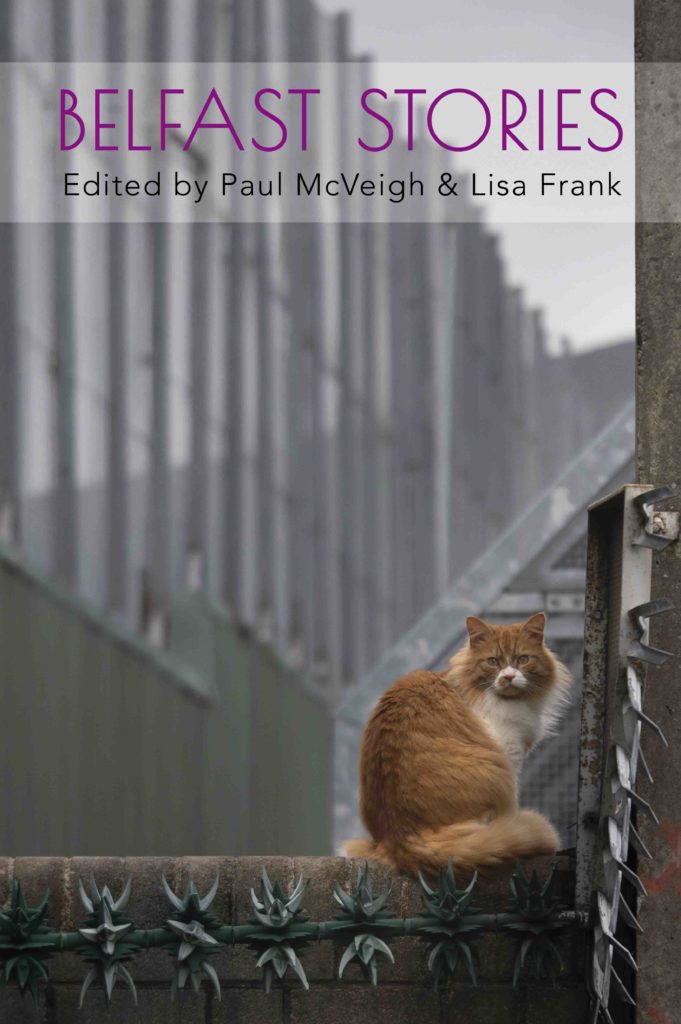Northern light
Belfast Stories. Paul McVeigh and Lisa Frank (eds). Doire Press; 261pp; €15/£13 pb; 21cm; 978-1-907682-69-8.

Devout, profane and hard
Six years after Galway Stories—featuring heavyweights like Kevin Barry, Mary Costello and Nuala O’Connor—Lisa Frank has repeated the formula with Belfast writer Paul McVeigh. And before reading a single story, a glance at the contents reminds us of the depth of talent hailing from the city Louis MacNeice described as ‘devout, profane and hard’.
Alongside stories from emerging authors, there are some spectacular contributions from David Park, Jan Carson, Ian Sansom, Bernie McGill and Glenn Patterson. Malachi O’Doherty’s photographs add atmosphere and perspective for readers not acquainted with the featured neighbourhoods. In his preface, O’Doherty writes: ‘It might overstate it just a little to say that while Derry was giving the world music, Belfast was telling stories’. And if newbie Wendy Erskine is an example of the talent this city nurtures, then it’s probably fair to say that Belfast is telling better stories than most. There is, as you’d expect, much humour—the flinty, mordant kind we’ve come to expect from Northerners. That said, the ‘hardness’ that MacNeice wrote about is still present, although perhaps softened.
In Erskine’s ‘Last Supper’, for instance, two café employees are spotted by an elderly lady customer in flagrante delicto in the toilets. Complaining to the manager, she declares: ‘They’re doing that and then they’re touching stuff like the sausage rolls. You know, they’re going out and working with the food.’ Brilliant! Sansom’s ‘Red Eye’ is snippets of conversation between a just-married Englishman and his distinctly Orange-tinged Belfast in-laws, and it’s as ‘devout, profane and hard’—and funny—as you’ll find.
The fun continues in Patterson’s ‘A Small Problem’. The protagonist explains how Belfast natives feel ‘duty-bound’ to ‘applaud all references to the Titanic’. He goes on: ‘I told him my apartment overlooked the dock where it was built. … My flat, to be strictly accurate, overlooked the clock, which overlooked the Custom House, which looked across the Lough around the corner from the dock where the Titanic was built …’
There’s darkness, too. Bernie McGill’s ‘There is More than One Word’ flinches in the full shade of the Troubles. Belfast-born Jaynie, who has been gone too long, doesn’t recognise her home town anymore. But the memory of her seventeen-year-old brother lingers. A young boy who must have said ‘the wrong thing’ and who, many years ago, became one of the Disappeared, never to be found. In Linda Anderson’s ‘Stone’, the protagonist is a tombstone engraver. Describing Roselawn Cemetery: ‘There are strict rules about avoidance of sectarian offence, no warlike slogans, no flags on graves. But paramilitary emblems are affixed to the fences instead, so that a parameter of prejudice encircles the place.’ Lest we forget, you might say.
This anthology is a treasure, holding its poise and balance while sweeping across the various facets of 21st-century Belfast, all fresh and aired, still battle- and Brexit-scarred, but ultimately hopeful.
Anne Cunningham
Belfast Stories is available in all good bookshops or buy directly here.











